Description
Familiarity with treatment
Minimal incision arm lift surgery, also known as brachioplasty, is a cosmetic procedure that aims to improve the appearance of the upper arms by removing excess skin and fat. It is typically performed on individuals who have loose or sagging skin in the upper arm area, often due to aging, weight loss, or genetics.
Unlike traditional arm lift surgery, which involves a long incision along the inner arm, minimal incision arm lift surgery uses smaller incisions that are strategically placed to minimize scarring. The surgeon will make small incisions in inconspicuous locations, such as the armpit or along the back of the arm, and then use specialized techniques to remove excess skin and fat.
The benefits of minimal incision arm lift surgery include:
- Reduced scarring: The smaller incisions used in this procedure result in less noticeable scars compared to traditional arm lift surgery.
- Quicker recovery: The smaller incisions and less invasive techniques used in minimal incision arm lift surgery typically result in a faster recovery time compared to traditional arm lift surgery.
- Improved arm contour: The procedure can help tighten and reshape the upper arms, resulting in a more toned and youthful appearance.
Who is it suitable for?
Minimal incision srm lift surgery, or brachioplasty, is suitable for individuals who have excess skin and fat in their upper arms and desire a more toned and contoured appearance. It is typically recommended for individuals who:
- Have loose or sagging skin in the upper arms: Minimal incision arm lift surgery can address excess skin that has lost elasticity due to factors such as aging, weight loss, or genetics.
- Have excess fat deposits in the upper arms: In some cases, Minimal incision arm lift surgery may be combined with liposuction to remove excess fat and improve arm contour.
- Have stable weight: It is important to have a stable weight before undergoing Minimal incision arm lift surgery. Significant weight fluctuations after the procedure can affect the results.
- Are in good overall health: Like any surgical procedure, Minimal incision arm lift surgery requires general good health to minimize the risks associated with anesthesia and the recovery process.
- Have realistic expectations: It is important to have realistic expectations about the outcome of the surgery. While Minimal incision arm lift surgery can improve the appearance of the upper arms, it is important to understand that there will be scarring, and individual results may vary.
Who is it not suitable for?
Minimal incision arm lift surgery, or brachioplasty, may not be suitable for everyone. There are certain factors that may make an individual not suitable for Minimal incision arm lift surgery. These may include:
- Poor overall health: Individuals with significant medical conditions or underlying health issues may not be suitable candidates for Minimal incision arm lift surgery. It is important to have good overall health to minimize the risks associated with anesthesia and the recovery process.
- Unstable weight: If an individual is still actively losing or gaining weight, it is generally recommended to stabilize their weight before considering Minimal incision arm lift surgery. Significant weight fluctuations after the procedure can affect the results and may require additional surgeries.
- Unrealistic expectations: It is important to have realistic expectations about the outcome of Minimal incision arm lift surgery. While the procedure can improve the appearance of the upper arms, it is important to understand that there will be scarring, and individual results may vary. If an individual has unrealistic expectations, they may not be suitable candidates for the surgery.
- Smoking or tobacco use: Smoking and tobacco use can impair the healing process and increase the risk of complications. Surgeons may advise individuals to quit smoking or using tobacco products before undergoing Minimal incision arm lift surgery.
- Insufficient arm skin laxity: Minimal incision arm lift surgery is primarily performed to address excess skin and fat in the upper arms. If an individual has minimal skin laxity or does not have enough excess skin to be removed, they may not be suitable candidates for the surgery.
Advantages
The advantages of minimal incision arm lift surgery include:
- Reduced scarring: The smaller incisions used in this procedure result in less noticeable scars compared to traditional arm lift surgery. The incisions are strategically placed in inconspicuous locations, such as the armpit or along the back of the arm, which helps minimize visible scarring.
- Quicker recovery: The smaller incisions and less invasive techniques used in minimal incision arm lift surgery typically result in a faster recovery time compared to traditional arm lift surgery. This means less downtime and a quicker return to normal activities.
- Improved arm contour: The procedure can help tighten and reshape the upper arms, resulting in a more toned and youthful appearance. Excess skin and fat are removed, and the remaining skin is tightened to create a smoother and more defined arm contour.
- Customizable results: Minimal incision arm lift surgery allows for a more precise and targeted approach to address specific concerns. The surgeon can tailor the procedure to meet the individual needs and goals of the patient, resulting in more personalized and natural-looking results.
- Minimal scarring visibility: The smaller incisions used in minimal incision arm lift surgery are strategically placed in areas that are less visible, such as the armpit or along the back of the arm. This helps minimize the visibility of scars, allowing patients to feel more confident and comfortable with their arms.
- Improved self-confidence: Excess skin and fat in the upper arms can be a source of self-consciousness for many individuals. By improving the appearance of the arms, minimal incision arm lift surgery can help boost self-confidence and improve body image.
Complications
Like any surgical procedure, Minimal incision arm lift surgery, or brachioplasty, carries potential risks and complications. It is important to be aware of these potential complications before undergoing the surgery. Some of the possible complications of Minimal incision arm lift surgery include:
- Scarring: Minimal incision arm lift surgery involves incisions, which will result in scars. The extent and visibility of the scars can vary depending on individual factors and the surgeon’s technique. While efforts are made to minimize scarring, it is important to understand that scars will be permanent.
- Infection: There is a risk of infection after any surgical procedure. Your surgeon will provide instructions on how to care for your incisions and minimize the risk of infection. If an infection occurs, it may require antibiotics or additional treatment.
- Bleeding: Excessive bleeding during or after the surgery is a potential complication. Your surgeon will take precautions to minimize bleeding during the procedure, and they will provide instructions on how to manage bleeding after the surgery.
- Hematoma: A hematoma is a collection of blood that can accumulate under the skin. It can cause swelling, pain, and may require drainage.
- Seroma: A seroma is a collection of fluid that can accumulate under the skin. It can cause swelling and discomfort. In some cases, the fluid may need to be drained.
- Poor wound healing: Some individuals may experience delayed wound healing or poor wound closure. This can lead to wound separation or a wider scar. Following your surgeon’s post-operative care instructions can help minimize this risk.
- Nerve damage: There is a small risk of nerve damage during Minimal incision arm lift surgery, which can result in temporary or permanent numbness, tingling, or changes in sensation in the arms.
- Unsatisfactory results: While Minimal incision arm lift surgery can improve the appearance of the upper arms, individual results may vary. It is important to have realistic expectations and understand that the outcome may not be exactly as desired.
Preoperative care
Preoperative care is an essential part of preparing for Minimal incision arm lift surgery, or brachioplasty. Following your surgeon’s instructions and taking certain precautions can help ensure a smooth and successful surgical experience. Here are some general preoperative care guidelines:
- Medical evaluation: Your surgeon will conduct a thorough medical evaluation to assess your overall health and determine if you are a suitable candidate for Minimal incision arm lift surgery. This may include reviewing your medical history, performing physical examinations, and ordering any necessary tests or lab work.
- Medication review: Inform your surgeon about any medications, supplements, or herbal remedies you are currently taking. Some medications may need to be adjusted or temporarily discontinued before the surgery, as they can increase the risk of bleeding or interfere with anesthesia.
- Smoking cessation: If you are a smoker, it is strongly recommended to quit smoking before undergoing Minimal incision arm lift surgery. Smoking can impair the healing process and increase the risk of complications. Your surgeon may provide resources or support to help you quit smoking.
- Avoid certain medications and substances: Your surgeon will provide specific instructions on which medications and substances to avoid before the surgery. This may include blood-thinning medications, aspirin, nonsteroidal anti-inflammatory drugs (NSAIDs), and alcohol, as they can increase the risk of bleeding or interfere with anesthesia.
- Fasting: Your surgeon will provide instructions on fasting before the surgery. Typically, you will be asked to avoid eating or drinking anything for a certain period of time before the procedure to ensure an empty stomach.
- Arrange transportation and support: Since Minimal incision arm lift surgery is performed under general anesthesia, you will not be able to drive yourself home after the procedure. Arrange for someone to drive you to and from the surgical facility and to stay with you for the initial recovery period.
- Follow preoperative instructions: Your surgeon will provide specific preoperative instructions tailored to your individual needs. This may include guidelines on showering, skincare, and avoiding certain activities or products before the surgery. It is important to follow these instructions closely to ensure optimal safety and preparation.
- Mental and emotional preparation: Minimal incision arm lift surgery is a significant procedure, and it is important to be mentally and emotionally prepared. Take the time to understand the procedure, discuss any concerns or questions with your surgeon, and ensure that you have realistic expectations about the outcome.
Postoperative care
Postoperative care is crucial for a successful recovery after Minimal incision arm lift surgery, or brachioplasty. Following your surgeon’s instructions and taking proper care of yourself can help promote healing and minimize the risk of complications. Here are some general postoperative care guidelines:
- Follow wound care instructions: Your surgeon will provide specific instructions on how to care for your incisions. This may include keeping the incisions clean and dry, changing dressings as instructed, and applying any prescribed ointments or creams. It is important to follow these instructions to promote proper healing and minimize the risk of infection.
- Manage pain and discomfort: It is normal to experience some pain, swelling, and discomfort after Minimal incision arm lift surgery. Your surgeon will prescribe pain medication to help manage any discomfort. Take the medication as directed and report any severe or persistent pain to your surgeon.
- Wear compression garments: Your surgeon may recommend wearing compression garments or sleeves on your arms to help reduce swelling and promote healing. Follow your surgeon’s instructions on when and how long to wear the compression garments.
- Limit physical activity: It is important to avoid strenuous activities and heavy lifting for a certain period of time after the surgery. Your surgeon will provide specific guidelines on when you can gradually resume normal activities and exercise. Follow these guidelines to prevent complications and promote proper healing.
- Attend follow-up appointments: Regular follow-up appointments with your surgeon are essential for monitoring your progress and ensuring proper healing. Attend all scheduled appointments and communicate any concerns or questions you may have.
- Maintain a healthy lifestyle: Adopting a healthy lifestyle can contribute to a successful recovery. Eat a nutritious diet, stay hydrated, and avoid smoking or using tobacco products, as they can impair the healing process.
- Be patient with the healing process: It takes time for the body to heal fully after Minimal incision arm lift surgery. Be patient and allow yourself the necessary time to recover. Avoid comparing your progress to others and focus on your own healing journey.
- Follow your surgeon’s instructions: Your surgeon will provide specific postoperative instructions tailored to your individual needs. It is important to follow these instructions closely, including any restrictions on bathing, skincare, and medication usage.
Only logged in customers who have purchased this product may leave a review.
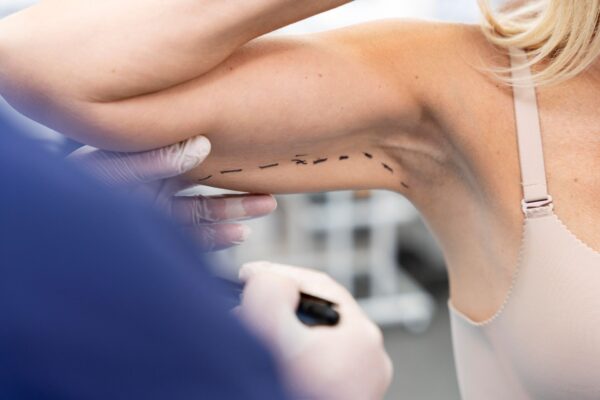
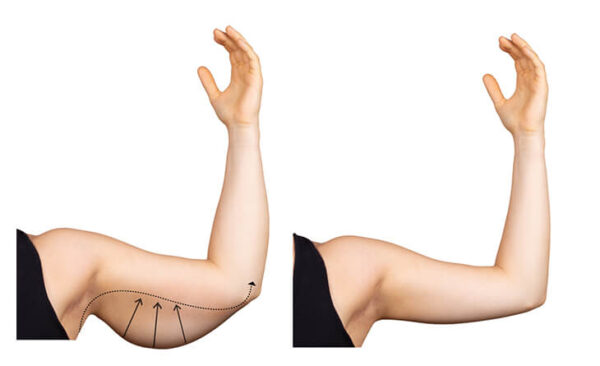
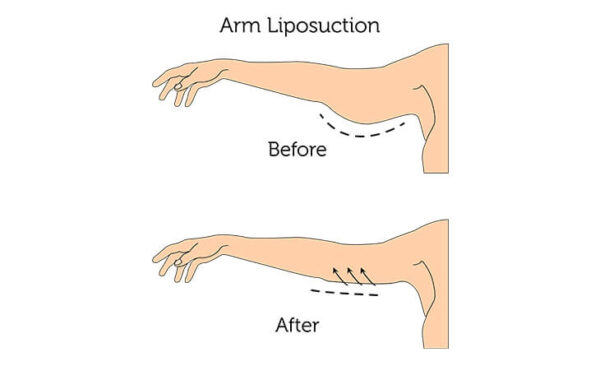
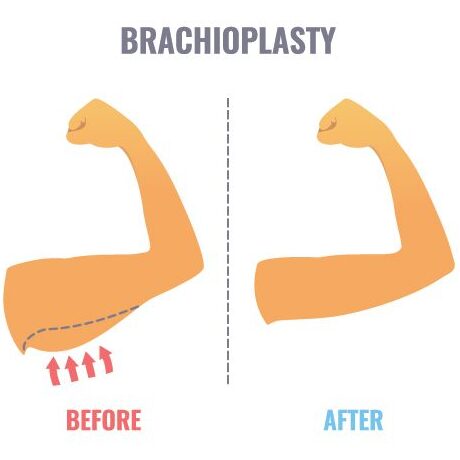


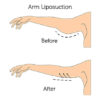
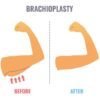
Reviews
There are no reviews yet.